
Полная версия:
The Fort

Bernard Cornwell
The Fort

Copyright
Published by HarperCollinsPublishers Ltd 1 London Bridge Street London SE1 9GF
www.harpercollins.co.uk
This paperback edition 2011
First published in Great Britain by
HarperCollinsPublishers 2010
THE FORT. Copyright © Bernard Cornwell 2010. All rights reserved under International and Pan-American Copyright Conventions. By payment of the required fees, you have been granted the nonexclusive, nontransferable right to access and read the text of this e-book on-screen. No part of this text may be reproduced, transmitted, downloaded, decompiled, reverse-engineered, or stored in or introduced into any information storage and retrieval system, in any form or by any means, whether electronic or mechanical, now known or hereinafter invented, without the express written permission of HarperCollins e-books.
Maps © Garry Gates 2010
Bernard Cornwell asserts the moral right to be identified as the author of this work
A catalogue record for this book is available from the British Library
ISBN: 978 0 00 733174 1
While some of the events and characters are based on historical incidents and figures, this novel is entirely a work of fiction.
EPub Edition © AUGUST 2011 ISBN: 9780007331765
Version: 2017-05-09
Dedication
THE FORT
is dedicated, with great admiration, to
Colonel John Wessmiller, US Army (Retired)
who would have known just what to do.
Contents
Cover
Title Page
Copyright
Dedication
Map
A Note on Names and Terms
One
There was not much wind so the ships headed sluggishly…
Two
Lieutenant-Colonel Paul Revere stood square in the Boston Armory yard.
Three
On Sunday, 18th July, 1779, Peleg Wadsworth worshipped at Christ…
Four
The fleet sailed eastwards, driven by a brisk south-westerly, though…
Five
The Tyrannicide, flying the pine-tree flag of the Massachusetts Navy,…
Six
The daylight was fading. The western sky glowed red and…
Seven
The first shots crashed into the trees, exploding twigs, pine…
Eight
Marine Captain Thomas Carnes and thirty men had been on…
Nine
‘Where the devil is Revere?’ Lovell asked. He had asked…
Ten
The sun had not risen when Peleg Wadsworth roused Lieutenant-Colonel…
Eleven
Wednesday, August 11th, started with a thick fog and still…
Twelve
And, suddenly, there was hope.
Thirteen
A Royal Marine at the taffrail of HMS North fired…
Fourteen
Peleg Wadsworth slept ashore, or rather he lay awake on…
Historical Note
Heroic Myths
The Midnight Ride of Paul Revere
The Burial of Sir John Moore after Corunna by Charles Wolfe 1791-1823
About the Author
Other Books by Bernard Cornwell
Credits
About the Publisher
Map
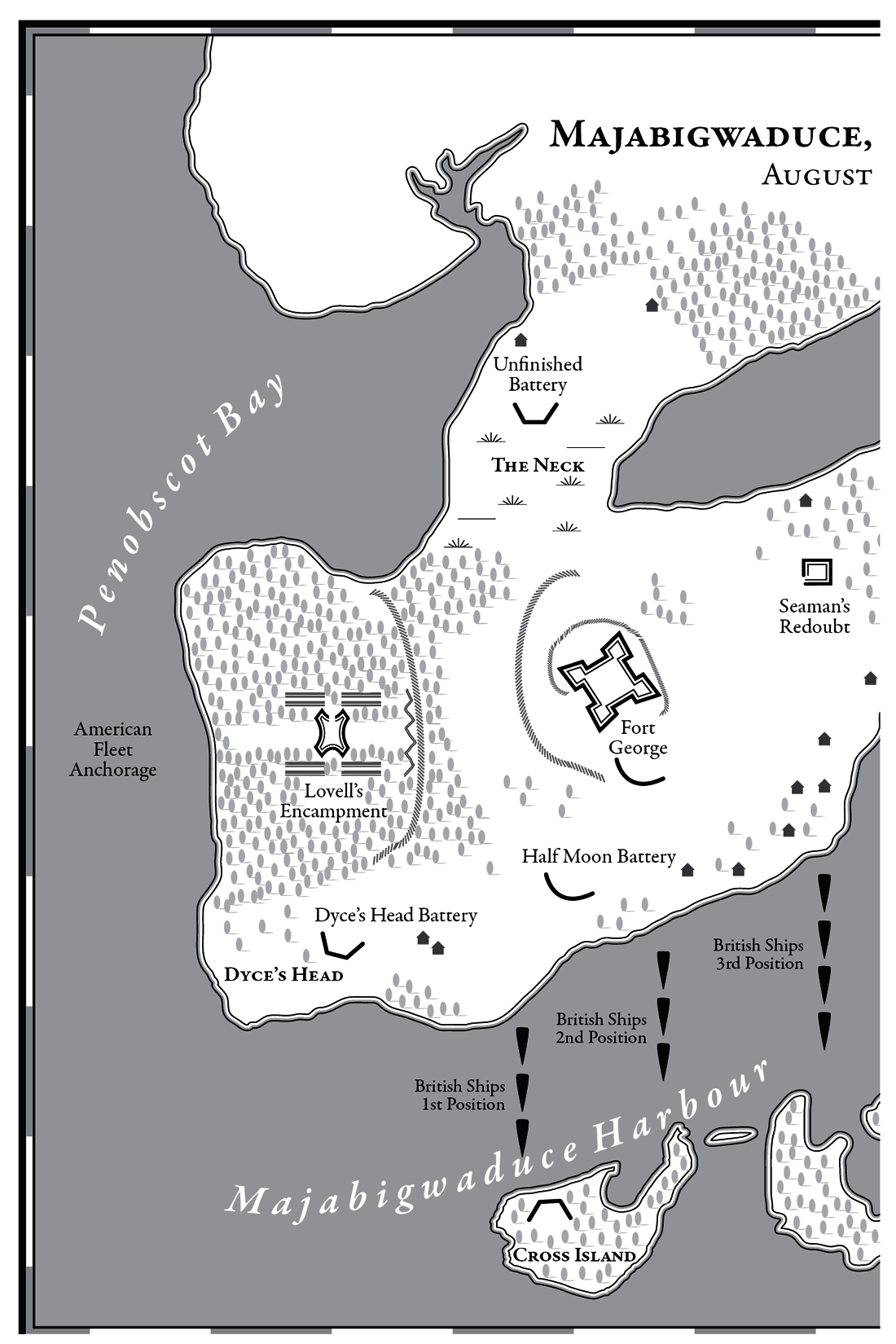
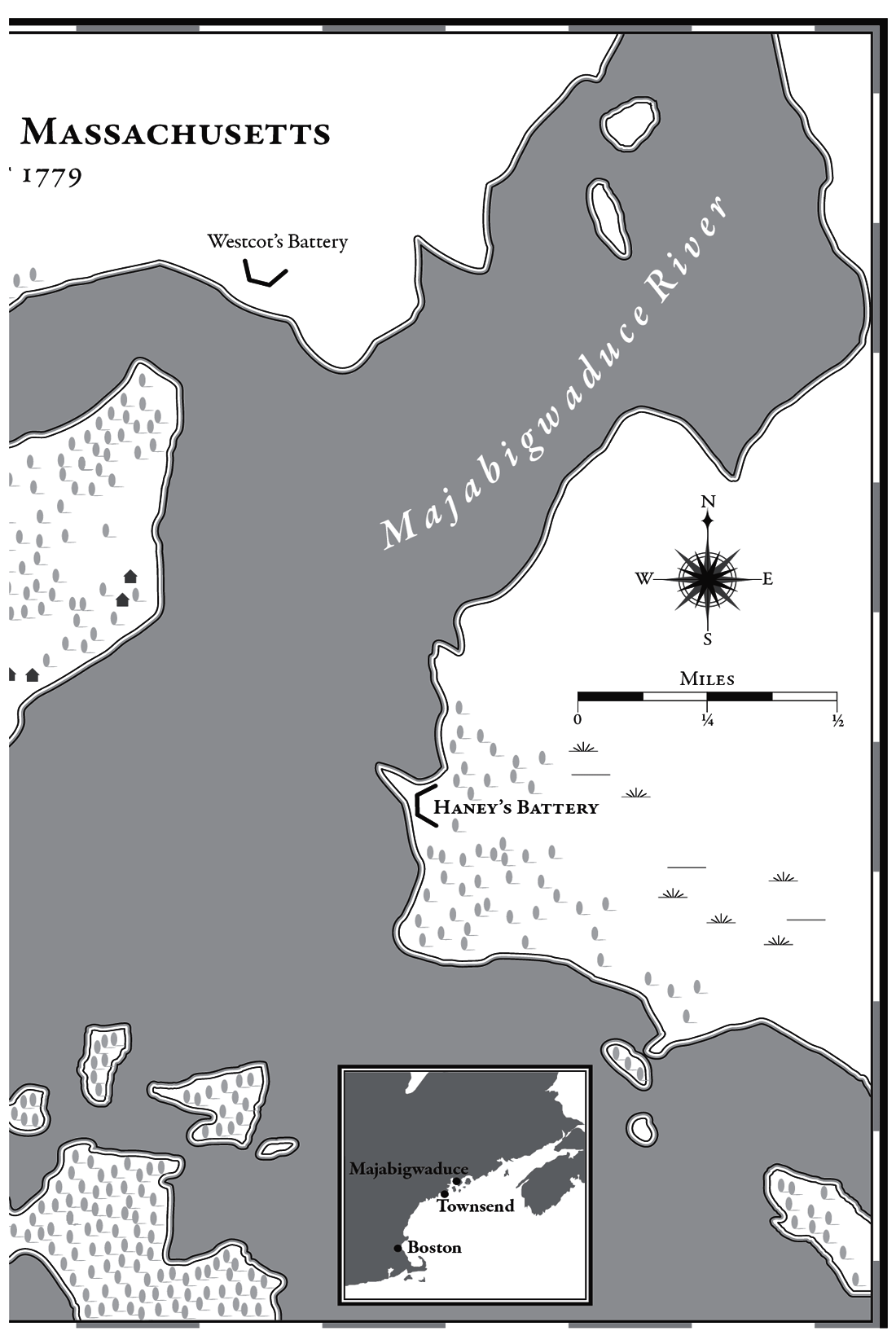
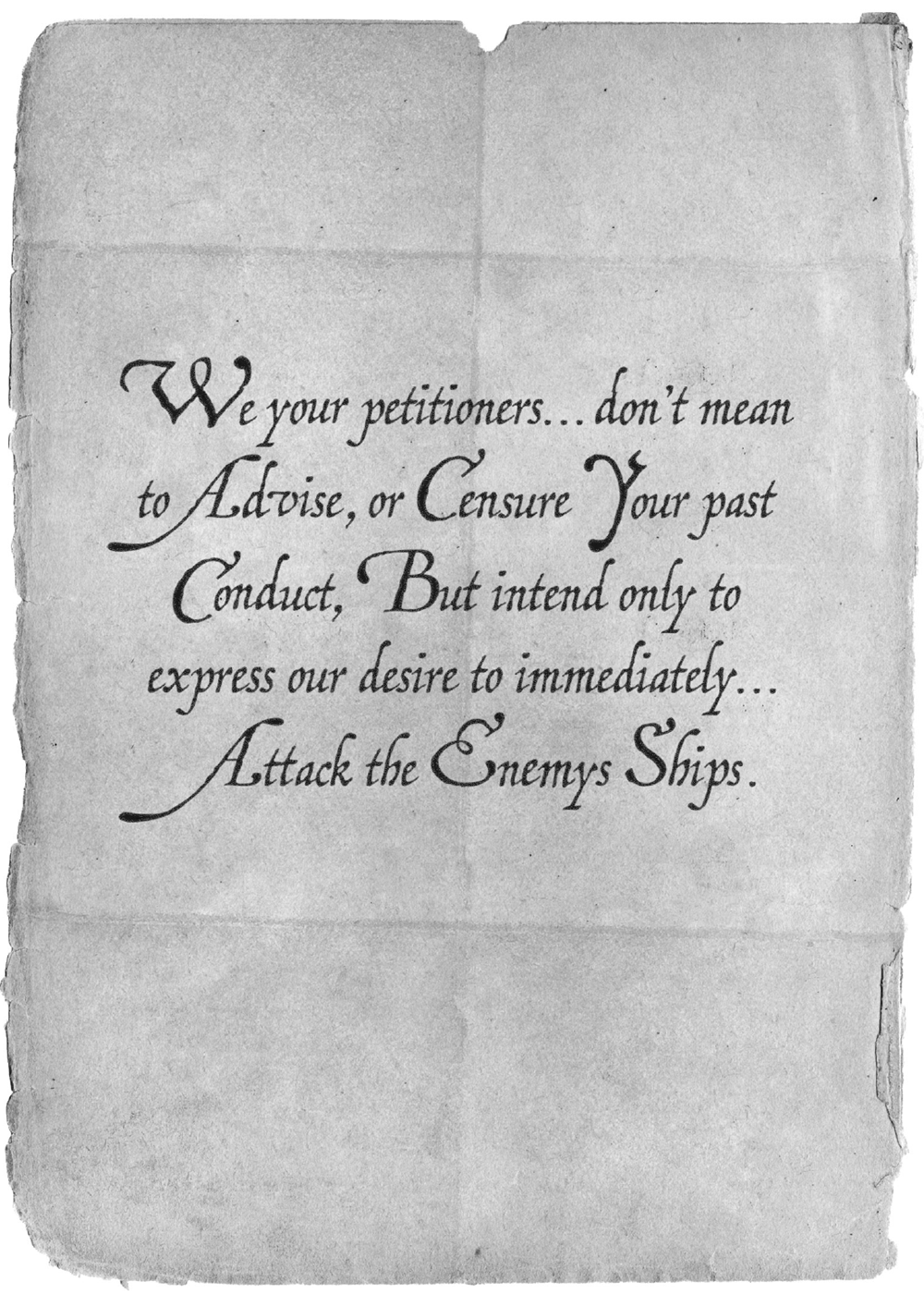
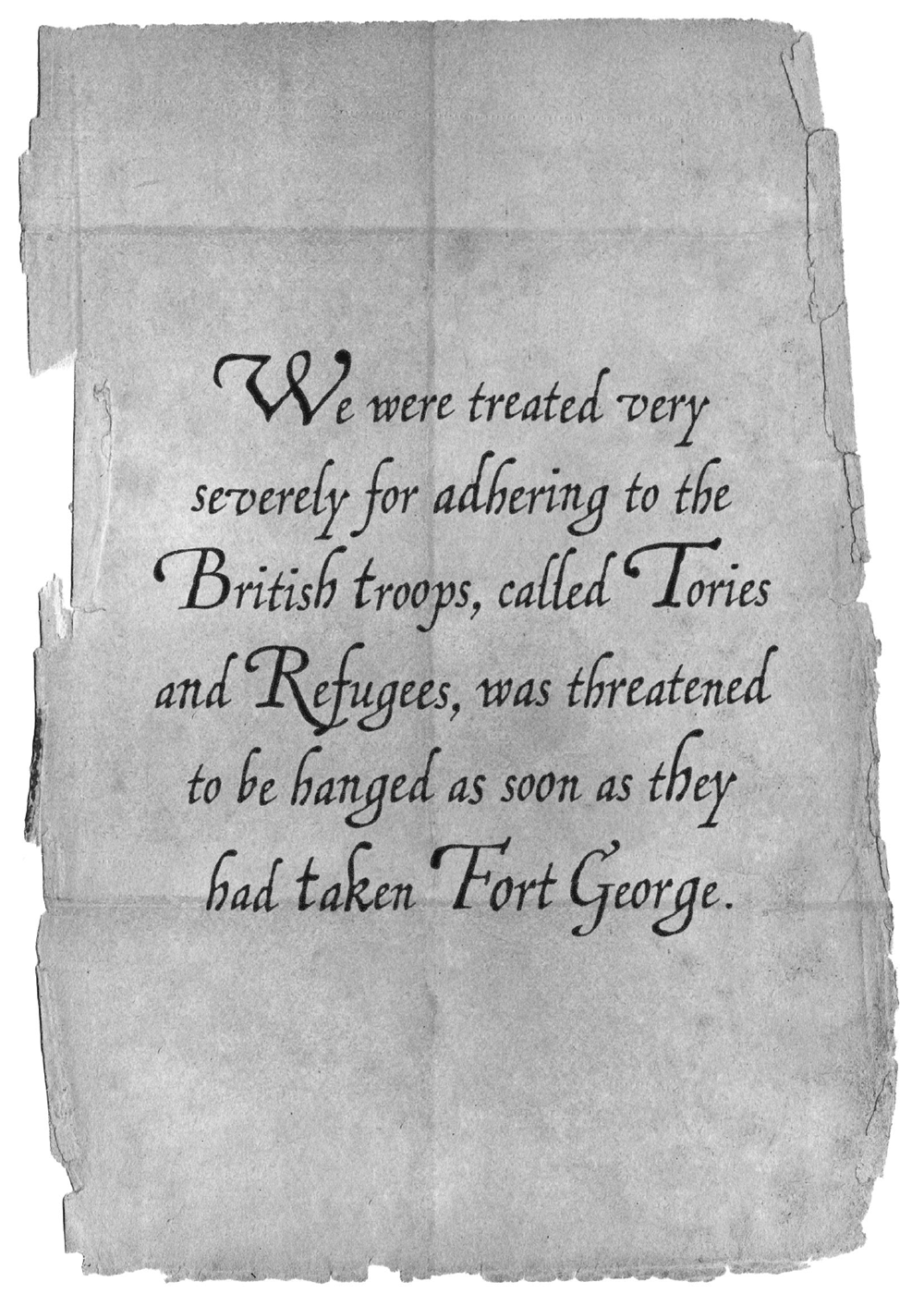
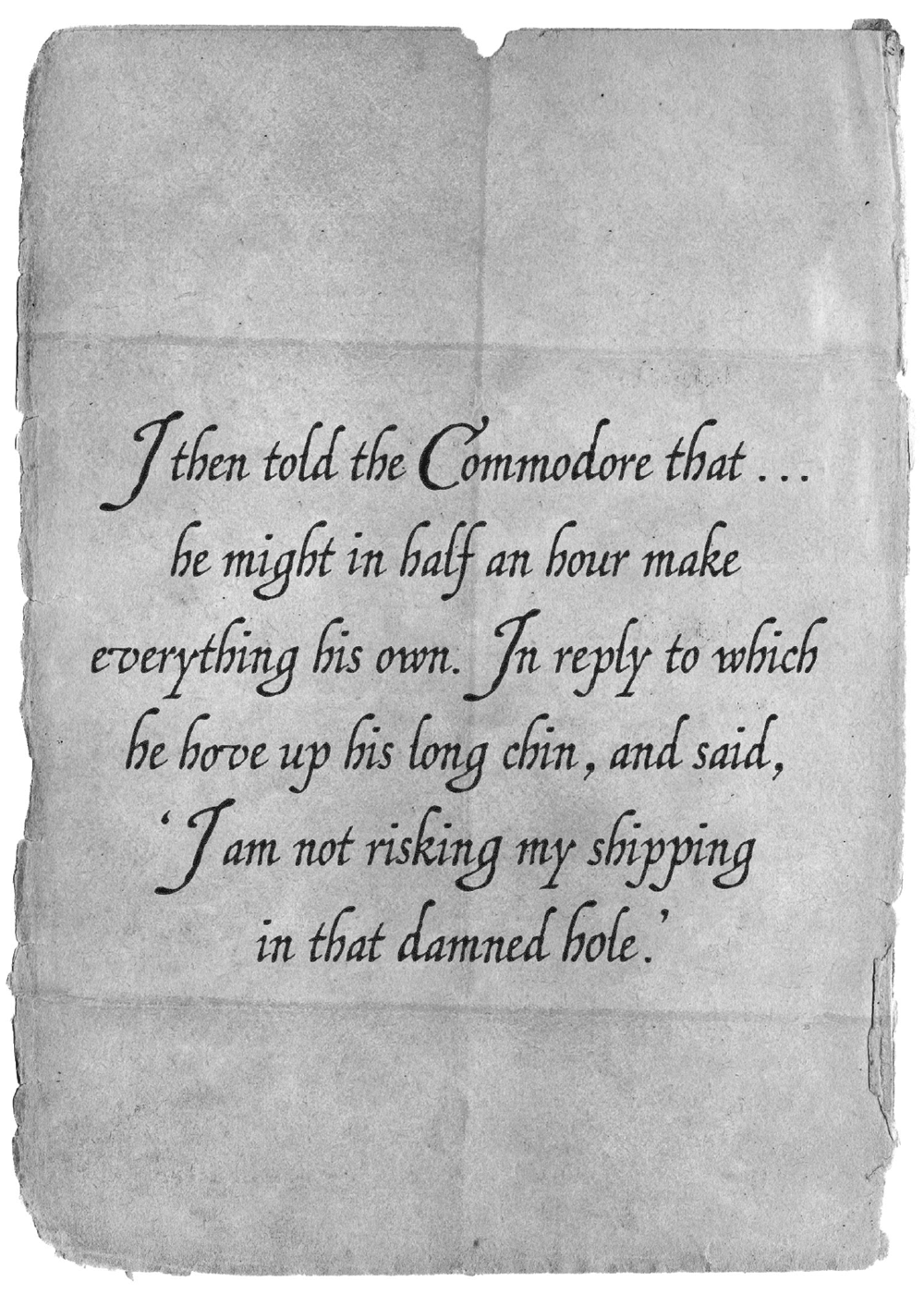
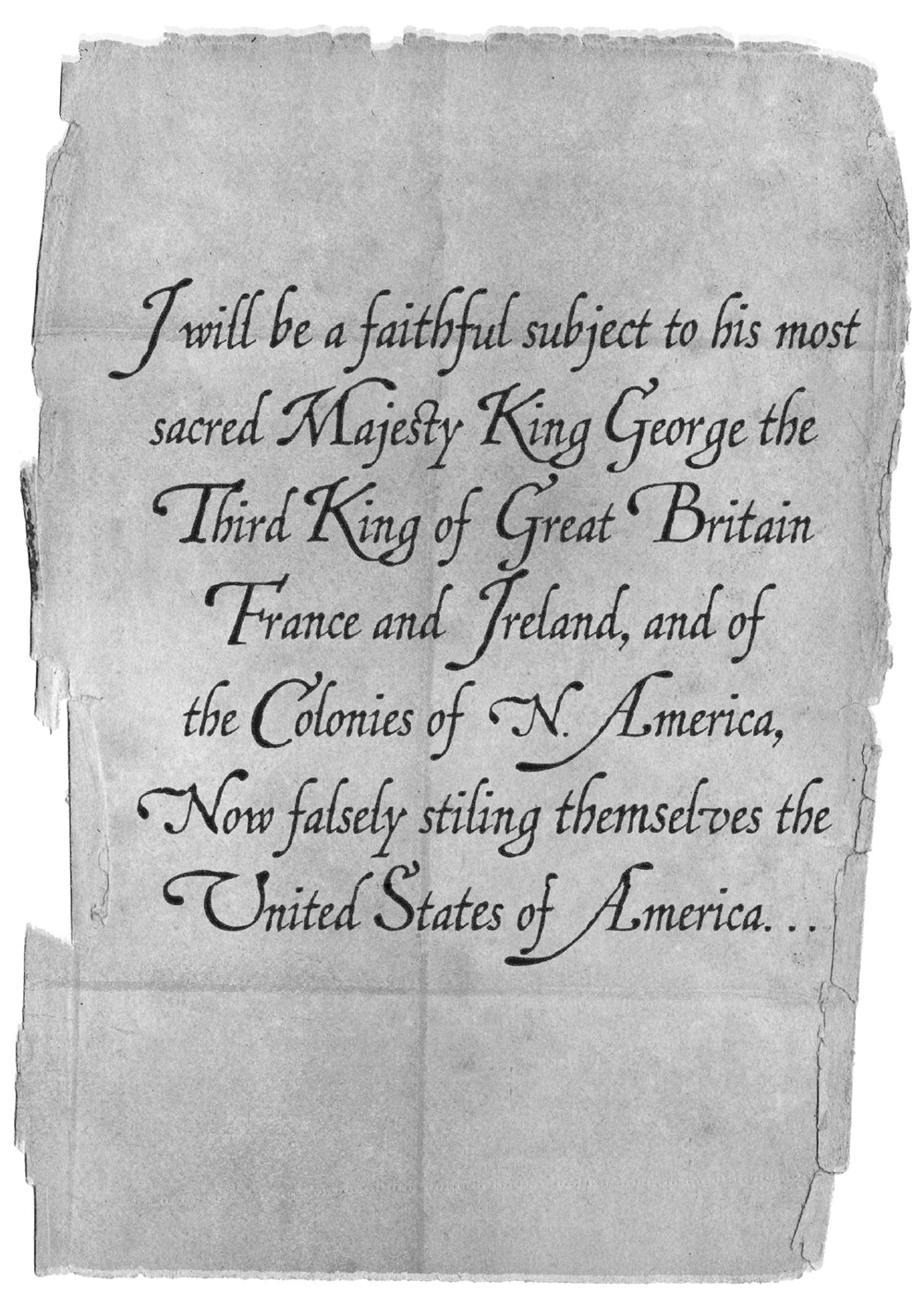
A NOTE ON NAMES AND TERMS
In 1779 there was no state of Maine, it was then the eastern province of Massachusetts. Some place names have also changed. Majabigwaduce is now called Castine, Townsend is Bucks Harbor, and Falmouth is Portland, Maine. Buck’s plantation (properly Plantation Number One) is Bucksport, Orphan Island is Verona Island, Long Island (in the Penobscot River) is now Islesboro Island, Wasaumkeag Point is now Cape Jellison and Cross Island is today called Nautilus Island.
The novel frequently refers to ‘ships’, ‘sloops’, ‘brigs’, and ‘schooners’. They are all, of course, ships in the same way that they are all boats, but properly a ship was a large, square-rigged, three-masted vessel like a frigate (think of the USS Constitution) or a ship of the line (like HMS Victory). Nowadays we think of a sloop as a single-masted sailboat, but in 1779 it denoted a three-masted vessel that was usually smaller than a ship and distinguished by having a flush main deck (thus no raised poop deck). Sloops, like ships, were square rigged (meaning they carried rectangular sails hung from crosswise yards). A brig, or brigantine, was also a large square-rigged sailing vessel, but with only two masts. Schooners, like brigs, carried two masts, but were rigged with fore-and-aft sails which, when hoisted, lie along the centre line of the vessel rather than across it. There were variations, such as brig-sloops, but at Penobscot Bay, in 1779, there were only ships, sloops, brigs and schooners. With the exception of the Felicity all the names of the boats are taken from history.
Most of the characters in the novel existed. The only fictional names are those of any character whose surname begins with F (with the exception of Captain Thomas Farnham, RN), and the names of British privates and non-commissioned officers (with the exception of Sergeant Lawrence, Royal Artillery).
Excerpt of letter from the Massachusetts Council, to Brigadier-General Solomon Lovell, July 2nd, 1779:
You will in all your operations consult with the Commander of the fleet that the Naval Force may cooperate with the troops under your command in Endeavoring to Captivate Kill or Destroy the whole force of the Enemy there both by sea & land. And as there is good reason to believe that some of the Principal men at Majorbagaduce requested the enemy to come there and take possession you will be peculiarly careful not to let any of them escape, but to secure them for their evil doings … We now commend you to the Supream being Sincerely praying him to preserve you and the Forces under your Command in health and safety, & Return you Crowned with Victory and Laurels.
From a postscript to Doctor John Calef’s Journal, 1780, concerning Majabigwaduce:
To this new country, the Loyalists resort with their families … and find asylum from the tyranny of Congress, and their taxgatherers … and there they continue in full hope, and pleasant expectation, that they may soon re-enjoy the liberties and privileges which would be best secured to them by the … British Constitution.
Letter from Captain Henry Mowat, Royal Navy, to Jonathan Buck, written aboard HMS Albany, Penobscot River, June 15th, 1779:
Sir, Understanding that you are at the head of a Regiment of the King’s deluded Subjects on this River and parts adjacent and that you hold a Colonel’s Commission under the influence of a body of men termed the General Congress of the United States of America, it therefore becomes my duty to require you to appear without loss of time before General McLean and the commanding Officer of the King’s Ships now on board the Blonde off of Majorbigwaduce with a Muster Roll of the People under your direction.
ONE
There was not much wind so the ships headed sluggishly upriver. There were ten of them, five warships escorting five transports, and the flooding tide did more to carry them northwards than the fitful breeze. The rain had stopped, but the clouds were low, grey and direful. Water dripped monotonously from sails and rigging.
There was little to see from the ships, though all their gunwales were crowded with men staring at the river’s banks that widened into a great inland lake. The hills about the lake were low and covered with trees, while the shoreline was intricate with creeks, headlands, wooded islands and small, stony beaches. Here and there among the trees were cleared spaces where logs were piled or perhaps a wooden cabin stood beside a small cornfield. Smoke rose from those clearings and some men aboard the ships wondered if the distant fires were signals to warn the country of the fleet’s arrival. The only people they saw were a man and a boy fishing from a small open boat. The boy, who was named William Hutchings, waved excitedly at the ships, but his uncle spat. ‘There come the devils,’ he said.
The devils were mostly silent. On board the largest warship, a 32-gun frigate named Blonde, a devil in a blue coat and an oilskin-covered cocked hat lowered his telescope. He frowned thoughtfully at the dark, silent woods past which his ship slid. ‘To my mind,’ he said, ‘it looks like Scotland.’
‘Aye, it does,’ his companion, a red-coated devil, answered cautiously, ‘a resemblance, certainly.’
‘More wooded than Scotland, though?’
‘A deal more wooded,’ the second man said.
‘But like the west coast of Scotland, wouldn’t you say?’
‘Not unlike,’ the second devil agreed. He was sixty-two years old, quite short, and had a shrewd, weathered face. It was a kindly face with small, bright blue eyes. He had been a soldier for over forty years and in that time had endured a score of hard-fought battles that had left him with a near-useless right arm, a slight limp, and a tolerant view of sinful mankind. His name was Francis McLean and he was a Brigadier-General, a Scotsman, commanding officer of His Majesty’s 82nd regiment of foot, Governor of Halifax, and now, at least according to the dictates of the King of England, the ruler of everything he surveyed from the Blonde’s quarterdeck. He had been aboard the frigate for thirteen days, the time it had taken to sail from Halifax in Nova Scotia, and he felt a twinge of worry that the length of the voyage might prove unlucky. He wondered if it might have been better to have made it in fourteen days and surreptitiously touched the wood of the rail. A burnt wreck lay on the eastern shore. It had once been a substantial ship capable of crossing an ocean, but now it was a ribcage of charred wood half inundated by the flooding tide that carried the Blonde upriver. ‘So how far are we now from the open sea?’ he asked the blue-uniformed captain of the Blonde.
‘Twenty-six nautical miles,’ Captain Andrew Barkley answered briskly, ‘and there,’ he pointed over the starboard bow and past the lion-crested cathead from which one of the frigate’s anchors was suspended, ‘is your new home.’
McLean borrowed the captain’s glass and, using his awkward right arm as a rest for the tubes, trained the telescope forrard. For a moment the small motions of the ship defeated him so that all he glimpsed was a blur of grey clouds, dark land and sullen water, but he steadied himself to see that the Penobscot River widened to make the great lake that Captain Barkley called Penobscot Bay. The bay, McLean thought, was really a great sea loch, which he knew from his study of Barkley’s charts was some eight miles from east to west and three miles from north to south. A harbour opened from the bay’s eastern shore. The mouth of the harbour was edged by rocks, while on its northern side was a hill crowned thick with trees. A settlement stood on the southern slope of that hill; over a score of wooden homes and barns were set among patches of corn, plots of vegetables and piles of timber. A handful of fishing boats was anchored in the harbour, along with one small brig that McLean assumed was a trading vessel. ‘So that’s Majabigwaduce,’ he said softly.
‘Back topsails!’ the captain called, ‘order the fleet to heave to. I shall trouble you to signal for a pilot, Mister Fennel!’
‘Aye aye, sir!’
The frigate suddenly seethed with men running to release sheets. ‘That’s Majabigwaduce,’ Barkley said in a tone that suggested the name was as risible as the place.
‘Number one gun!’ Lieutenant Fennel shouted, provoking another rush of men who ran to the forward starboard cannon.
‘Do you have any idea,’ McLean asked the captain, ‘what Majabigwaduce signifies?’
‘Signifies?’
‘Does the name mean anything?’
‘No idea, no idea,’ Barkley said, apparently irritated by the question. ‘Now, Mister Fennel!’
The gun, charged and wadded, but without any shot, was fired. The recoil was slight, but the sound of the gun seemed hugely loud and the cloud of smoke enveloped half the Blonde’s deck. The gunshot faded, then was echoed back from the shore before fading a second time.
‘We shall discover something now, won’t we?’ Barkley said.
‘What is that?’ McLean enquired.
‘Whether they’re loyal, General, whether they’re loyal. If they’ve been infected by rebellion then they’ll hardly supply a pilot, will they?’
‘I suppose not,’ McLean said, though he suspected a disloyal pilot could well serve his rebellious cause by guiding HMS Blonde onto a rock. There were plenty of those breaking the bay’s surface. On one, not fifty paces from the frigate’s port gunwales, a cormorant spread its dark wings to dry.
They waited. The gun had been fired, the customary signal requesting a pilot, but the smoke prevented anyone aboard from seeing whether the settlement of Majabigwaduce would respond. The five transport ships, four sloops and frigate drifted upriver on the tide. The loudest noise was the groan, wheeze and splashing from the pump aboard one of the sloops, HMS North. The water spurted and gushed rhythmically from an elm spigot set into her hull as sailors pumped her bilge. ‘She should have been broken up for firewood,’ Captain Barkley said sourly.
‘There’s no patching her?’ McLean asked.
‘Her timbers are rotten. She’s a sieve,’ Barkley said dismissively. Small waves slapped the Blonde’s hull, and the blue ensign at her stern stirred slow in the fitful wind. Still no boat appeared and so Barkley ordered the signal gun fired a second time. The sound echoed and faded again and, just when Barkley was considering taking the flotilla into the harbour without the benefit of a pilot, a seaman hailed from the foremast top. ‘Boat coming, sir!’
When the powder smoke cleared, the men on Blonde saw a small open boat was indeed tacking out from the harbour. The south-west breeze was so light that the tan-coloured sails hardly gave the boat any headway against the tide, and so a young man was pulling on two long oars. Once in the wide bay he shipped the oars and sheeted his sails hard so that the small boat beat slowly up to the flotilla. A girl sat at the tiller and she steered the little craft against the Blonde’s starboard flank where the young man leaped nimbly onto the boarding steps that climbed the tumblehome. He was tall, fair-haired, with hands calloused and blackened from handling tarred rigging and fishing nets. He wore homespun breeches and a canvas jacket, had clumsy boots and a knitted hat. He climbed to the deck, then called down to the girl. ‘You take good care of her, Beth!’
‘Stop gawping, you puddin’-headed bastards!’ the bosun roared at the seamen staring at the fair-haired girl who was using an oar to push her small craft away from the frigate’s hull. ‘You’re the pilot?’ the bosun asked the young man.
‘James Fletcher,’ the young man said, ‘and I guess I am, but you don’t need no pilot anyways.’ He grinned as he walked towards the officers at the Blonde’s stern. ‘Any of you gentlemen have tobacco?’ he asked as he climbed the companionway to the poop deck. He was rewarded with silence until General McLean reached into a pocket and extracted a short clay pipe, its bowl already stuffed with tobacco.
‘Will that do?’ the general asked.
‘That’ll do just perfect,’ Fletcher said appreciatively, then prised the plug from the bowl and crammed it into his mouth. He handed the empty pipe back to the general. ‘Haven’t had tobacco in two months,’ he said in explanation, then nodded familiarly to Barkley. ‘Ain’t no real dangers in Bagaduce, Captain, just so long as you stand off Dyce’s Head, see?’ He pointed to the tree-crowned bluff on the northern side of the harbour entrance. ‘Rocks there. And more rocks off Cross Island on the other side. Hold her in the channel’s centre and you’ll be safe as safe.’
‘Bagaduce?’ General McLean asked.
‘That’s what we call it, your honour. Bagaduce. Easier on the tongue than Majabigwaduce.’ The pilot grinned, then spat tobacco juice that splattered across the Blonde’s holy-stoned planking. There was silence on the quarterdeck as the officers regarded the dark stain.
‘Majabigwaduce,’ McLean broke the silence, ‘does it mean anything?’
‘Big bay with big tides,’ Fletcher said, ‘or so my father always said. ’Course it’s an Indian name so it could mean anything.’ The young man looked around the frigate’s deck with an evident appreciation. ‘Day of excitement, this,’ he remarked genially.
‘Excitement?’ General McLean asked.
‘Phoebe Perkins is expecting. We all thought the baby would have dropped from her by now, but it ain’t. And it’ll be a girl!’
‘You know that?’ General McLean asked, amused.
‘Phoebe’s had six babes already and every last one of them a girl. You should fire another gun, Captain, startle this new one out of her!’
‘Mister Fennel!’ Captain Barkley called through a speaking trumpet, ‘sheet in, if you please.’
The Blonde gathered way. ‘Take her in,’ Barkley told the helmsman, and so the Blonde, the North, the Albany, the Nautilus, the Hope, and the five transports they escorted came to Majabigwaduce. They arrived safe in the harbour and anchored there. It was June 17th, 1779 and, for the first time since they had been driven from Boston in March, 1776, the British were back in Massachusetts.
Some two hundred miles west and a little south of where the devils arrived, Brigadier-General Peleg Wadsworth paraded his battalion on the town common. Only seventeen were present, not one of whom could be described as correct. The youngest, Alexander, was five, while the oldest were the twelve-year-old Fowler twins, Rebecca and Dorcas, and they all gazed earnestly at the brigadier, who was thirty-one. ‘What I want you to do,’ the general said, ‘is march forward in single file. On the word of command you stop. What is the word of command, Jared?’
Jared, who was nine, thought for a second. ‘Halt?’
‘Very good, Jared. The next command after that will be “prepare to form line”, and you will do nothing!’ The brigadier peered sternly at his diminutive troops who were in a column of march facing northwards. ‘Understand? You do nothing! Then I’m going to shout that companies one, two, three and four will face left. Those companies,’ and here the general walked down the line indicating which children comprised the leading four companies, ‘are the left wing. What are you, Jared?’
‘The left wing,’ Jared said, flapping his arms.
‘Excellent! And you,’ the general paced on down the rest of the line, ‘are companies five, six, seven and eight, the right wing, and you will face right. I shall then give the order to face front and you turn. Then we counter-wheel. Alexander? You’re the colour party so you don’t move.’
‘I want to kill a redcoat, Daddy,’ Alexander pleaded.
‘You don’t move, Alexander,’ the colour party’s father insisted, then repeated all he had said. Alexander was holding a long stick that, in the circumstances, substituted for the American flag. He now aimed this at the church and pretended to shoot redcoats and so had to be chivvied back into the column that singly and generally agreed that they understood what their erstwhile schoolmaster wanted them to do. ‘Now remember,’ Peleg Wadsworth encouraged them, ‘that when I order counter-wheel you march in the direction you’re facing, but you swing around like the arm of a clock! I want to see you turn smoothly. Are we all ready?’
A small crowd had gathered to watch and advise. One man, a visiting minister, had been appalled to see children so young being taught the rudiments of soldiery and had chided General Wadsworth on the matter, but the brigadier had assured the man of God that it was not the children who were being trained, but himself. He wished to understand precisely how a column of companies deployed into a regimental line that could blast an enemy with musket fire. It was hard to advance troops in line because a long row of men inevitably straggled and lost its cohesion, to avoid which men must advance in companies, one behind the other, but such a column was fatally vulnerable to cannon-fire and quite unable to use most of its muskets, and so the art of the manoeuvre was to advance in column and then deploy swiftly into line. Wadsworth wanted to master the drill, but because he was a general of the Massachusetts Militia, and because the militia were mostly on their farms or in their workshops, Wadsworth was using children. The leading company, which would normally hold three ranks of thirty or more men each, was today comprised of Rebecca Fowler, aged twelve, and her nine-year-old cousin, Jared, both of whom were bright children and, Wadsworth hoped, capable of setting an example that the remaining children would copy. The manoeuvre he was attempting was difficult. The battalion would march in column towards the enemy and then halt. The leading companies would turn to face one way, the rearward companies turn to face the opposite direction and then the whole line would counter-wheel about the colours in a smooth pivot until commanded to halt. That would leave the first four companies facing away from the enemy and Wadsworth would need to order those eight children to about turn, at which point the whole formidable battalion would be ready to open fire against the enemy. Wadsworth had watched British regiments perform a similar manoeuvre on Long Island and he had reluctantly admired their precision and seen for himself the swiftness with which they had been transformed from a column into a long line that had unleashed a torrent of musketry on the American forces.
‘Are we ready?’ Wadsworth asked again. If he could explain the system to children, he had decided, then teaching the state militia should be easy enough. ‘Forward march!’
The children marched creditably well, though Alexander kept skipping to try and match steps with his companions. ‘Battalion!’ Wadsworth called, ‘Halt!’
They halted. So far so good. ‘Battalion! Prepare to form line! Don’t move yet!’ He paused a moment. ‘The left wing will face left! The right wing will face right, on my word of command. Battalion! Face front!’
Rebecca turned right instead of left and the battalion milled about in a moment of confusion before someone’s hair was pulled and Alexander began shouting bang as he shot imaginary redcoats coming from the Common Burying Ground. ‘Counter-wheel, march!’ Wadsworth shouted, and the children swivelled in different directions and by now, the general thought despairingly, the British troops would have hammered two slaughterous volleys into his regiment. Perhaps, Wadsworth thought, using the children from the school where he had taught before becoming a soldier was not the best way to develop his mastery of infantry tactics. ‘Form line,’ he shouted.
‘The way to do it,’ a man on crutches offered from the crowd, ‘is company by company. It’s slower, General, but slow and steady wins the day.’
‘No, no, no!’ someone else chimed in. ‘First company front right marker to step one pace left and one pace forward, and he becomes left marker, raises his hand, and the rest fall in on him. Or her, in your regiment, General.’



